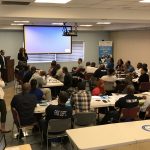Mass casualty training
 First responders train in Cayman Islands Incident Command Systems and Mass Casualty Management
First responders train in Cayman Islands Incident Command Systems and Mass Casualty Management
Approximately 40 first responders from frontline agencies have been receiving training in Mass Casualty Management (MCM) and Incident Command Systems (ICS) during a five-day course last week.
The Pan American Health Organisation (PAHO) and Hazard Management Cayman Islands (HMCI) sponsored the courses from 23rd – 28th April 2018.
The training sessions covered the structure, functions and responsibilities of managing incident sites, responding to complex incidents and coordinating a multiple agency response.
Some of the specific subject areas covered in the training included: emergency medicine, the organisation of advanced medical posts, psychosocial care, division of roles and responsibilities and tasks of first responders.
Participants included representatives from the Cayman Islands Port Authority, Customs Department, Cayman Islands Airport Authority (CIAA), Royal Cayman Islands Police Service (RCIPS), Cayman Islands Fire Service (CIFS), Health Service Authority (HSA) and Cayman Islands Emergency Medical Service (CIEMS), as well as volunteer agencies such as the Red Cross and Community Emergency Response Teams (CERT’s).
Local instructors Mr. Richard Barrow and Mr. Ian Yearwood with the RCIPS, Mr. Simon Boxall with HMCI, Mr. Andrew McLaughlin with CIAA and Mr. Shane Brown with CIEMS conducted the MCM course along with a PAHO instructor.
“This type of hands-on training is crucial for the continued development of capacity within our emergency response agencies,” Minister for the Ministry of Home Affairs, Hon. Tara Rivers said. “First responders are building on their existing knowledge and expertise through participation in these courses which should enhance our country’s preparedness and response capability and ensure that we maintain a state of maximum readiness.”
Course Coordinator, HMCI’s Deputy Director for Preparedness Danielle Coleman, explained that a mass casualty incident is any event resulting in a number of victims large enough to disrupt the normal course of emergency health care services. For example, it could be a situation such as a major fire, or a multi-car traffic accident.
“At HMCI, we are strong believers in increasing local resilience and knowledge, consequently some time ago a number of local instructors from a variety of first response agencies were trained to facilitate both MCM and ICS training,” she said. “It makes sense to utilise our own facilitators because they have an extensive knowledge of how things are actually done locally with regards to major incident response and have existing relationships with key stakeholders.”
Ms. Coleman added: “It is important that we have pre-established procedures in place for rescue mobilisation, incident site management and hospital reception in the event that we face a large emergency situation, especially those involving multiple victims and a multi-agency response. This course makes us better prepared to provide prompt and appropriate assistance to victims and it will help us to prioritize the victims and minimize further injuries so the most critical receive the most immediate medical attention.”
Ms. Coleman concluded: “Depending on the type of incident, one particular agency assumes overall responsibility as the incident commander and they are supported by all other first responders.
Obviously this is different to a more routine response whereby an agency might be the sole responding agency. However, when multiple agencies respond together, for example in the event of a plane crash, you are likely to have personnel from the Fire Service, Police, Civil Aviation, HSA, forensic examiners, HMCI and many other agencies on the scene. We need to ensure that we can collaborate, communicate, cooperate and work together as efficiently as possible to provide an effective and efficient response.”
The final exercise for the Mass Casualty Management and Incident Command systems training commenced at 7 pm on Friday April 27th at the Truman Bodden Sports Stadium and included the use of Fire Trucks, the EMS Disaster Response and Triage trailer, ambulances and mobile lighting systems.
The exercise continued through the night and into the early hours on Saturday morning.








